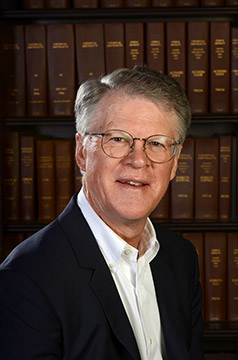Prelog Lecture 2015
Prof. Peter Dervan

It is with great pleasure that the Laboratory of Organic Chemistry of ETH Zurich awards the 2015 Prelog Medal and Lectureship to Professor Peter B. Dervan in recognition of his outstanding research in chemical biology, with special emphasis on molecular recognition of double helical DNA by small molecules and their use in biological applications.
Professor Dervan was born June 28, 1945 in Boston and received his undergraduate degree in Chemistry in 1967 at Boston College. He obtained his Ph.D. in 1972 at Yale University under the supervision of Professor Jerome A. Berson investigating thermal rearrangements and the limits of orbital symmetry rules. His thesis on the four-pathway analysis of the 1,3 sigmatropic rearrangement was considered a classic in the field. For postdoctoral research, Dervan joined Professor Eugene Van Tamelen’s group in early 1973 at Stanford University. There he broadened his research horizons beyond physical organic to synthetic chemistry, especially applied to nucleic acids. Dervan’s postdoctoral research at Stanford was a brief six months. He moved to Pasadena in Fall 1973 (age 28) to accept a position at the California Institute of Technology as Assistant Professor of Chemistry. Dervan was promoted to Professor of Chemistry in 1980 and since 1988 he has been the Bren Professor of Chemistry. He served as Chair of the Division of Chemistry and Chemical Engineering from 1994 to 1999.
Dervan was visiting professor at the ETH Zurich (1983), the Alexander Todd Visiting Professor at the University of Cambridge (1989), the Rolf Sammet Visiting Professor at Johann Wolfgang Goethe Universität, Frankfurt (1993) and Smets Visiting Professor, at Universeté Catholique de Louvain and Katholiek Universiteit van Leuven, Belgium (1994). He has received Doctor of Science honorary degrees from Boston College (1997) and the University of Wisconsin-Madison (2015).
Dervan’s early work at Caltech was in the area of physical organic chemistry. His most significant contribution was the experimental determination of the relative rates of rotation, cleavage, and closure of the parent 1,4-biradical, tetramethylene. His demonstration of the 1,4-biradical as a common intermediate generated from different precursors was considered an experimental tour de force. Dervan made a decision in the 1970s to move research from studies of reactive intermediates to understanding the ensembles of weak interactions underpinning molecular recognition in water. He believed the frontier was to understand molecular recognition in aqueous systems, the solvent of life, and probe macromolecular targets important in biology such as nucleic acids and proteins. His major contribution was studies directed toward understanding the chemical principles for the sequence specific recognition of double helical DNA. Dervan and his coworkers brought the power of synthetic chemistry and the logic of incremental change to molecular recognition in biological systems. He is considered an early pioneer of the field of chemical biology.
Professor Dervan received the 2006 National Medal of Science from President Bush “for his fundamental research contributions at the interface of chemistry and biology and his influence in education and industrial innovation.” Other awards include the Harrison Howe Award (1988), ACS Arthur C. Cope Award (1993), Willard Gibbs Medal (1993), Nichols Medal (1994), Maison de la Chimie Foundation Prize (1996), Remsen Award (1998), Kirkwood Medal (1998), ACS Alfred Bader Award (1999), Max Tishler Prize (1999), Linus Pauling Medal (1999), Richard C. Tolman Medal (1999), Tetrahedron Prize (2000), Harvey Prize (Israel) (2002), ACS Ronald Breslow Award (2005), Wilbur Cross Medal (2005) and the Frank H. Westheimer Medal (2009). He is a member of the National Academy of Sciences, the National Academy of Medicine, the American Academy of Arts and Sciences, the American Philosophical Society, the French Academy of Sciences and the German Academy of Sciences.
Peter Dervan has served on several Scientific Advisory Boards for the pharmaceutical and biotechnology industries. He is a founding member of the Scientific Advisory Board of Gilead Sciences. He was a member of the Board of Directors of Beckman Coulter (1988-2011). He is a Trustee of Yale University (2008- ); member of the Board of Scientific Governors, The Scripps Research Institute; Board of Directors of the Chemical Heritage Foundation and is Chair of the Scientific Advisory Board of the Robert A. Welch Foundation. He was Chair of the NRC Board of Chemical Sciences and is currently Chair of the Chemistry Section of the National Academy of Sciences. He has served on several editorial advisory boards over the past 40 years. Professor Dervan is an outstanding teacher, having received several teaching awards given by the undergraduate students at Caltech over three decades. Perhaps Dervan’s greatest influence will be his academic mentoring. Over 60 of Dervan’s former graduate and postdoctoral coworkers hold academic research positions around the world, many of whom are leaders in chemistry, biology and medicine.